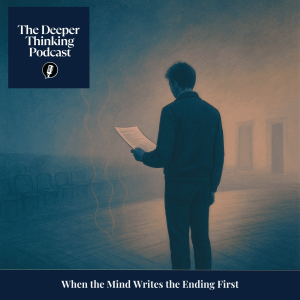
Thursday May 15, 2025
When the Mind Writes the Ending First: Dread, Imagination, and the Ethics of Not Knowing - The Deeper Thinking Podcast
When the Mind Writes the Ending First: Dread, Imagination, and the Ethics of Not Knowing
For anyone who’s lived inside the tension of anticipation, and longed for gentler ways to meet the unknown.
Some thoughts don’t arrive with sound. They unfold quietly, posing as realism, slipping past awareness until they’ve shaped the emotional weather of a day. In this episode, we explore how the mind turns ambiguity into catastrophe—not out of dysfunction, but out of memory, vigilance, and the need for control. This is an examination of imagined endings, rehearsed fears, and the strange comfort of believing you already know how things will fall apart.
This is not about optimism. It’s about attending to the stories we silently tell ourselves. Drawing from existential thought, phenomenology, and the gentle precision of cognitive theory, we explore how dread becomes a strategy of survival—and what happens when we stop performing the collapse. With quiet allusions to thinkers like Martin Heidegger, Simone Weil, and Maurice Merleau-Ponty, we ask what it means to remain in the space before the story ends—and to breathe there.
This is an episode for anyone who has lived inside the architecture of imagined harm. For those who have mistaken thought for foresight, vigilance for wisdom, rehearsal for truth. It offers no fix, no instruction—just a quieter atmosphere. A place to hear the spiral and gently choose not to follow it.
Reflections
This episode opens a different kind of door. It doesn’t resolve fear but disarms it, not with answers—but with presence.
Here are some reflections that surfaced along the way:
- Catastrophizing isn’t about expecting the worst—it’s about needing certainty where none exists.
- Imagined endings are not failures of logic, but gestures of care misdirected by fear.
- We often mistake prediction for preparation. But preparation without presence becomes performance.
- Some rehearsals are invisible. They shape tone, posture, even breath.
- The most dangerous stories are the ones we don’t realise we’re telling.
- There is a difference between protecting yourself and abandoning the moment.
- Staying doesn’t mean knowing—it means not fleeing before meaning has a chance to form.
- Imagination is not the enemy. But it needs to be interrupted when it starts writing tragedies by default.
- To leave a story unfinished is not failure. It may be the beginning of something truer.
Why Listen?
- Understand catastrophizing as a relational, embodied response—not a mental flaw
- Discover how internal narratives shape perception, connection, and breath
- Explore how to gently unwrite the ending without losing your place in the story
- Engage with Heidegger, Weil, and Merleau-Ponty on dread, ambiguity, and the lived present
Listen On:
Support This Work
If this episode lingered with you and you’d like to support deeper listening, you can do so quietly here: Buy Me a Coffee. Thank you for being part of this unfolding.
Bibliography
- Heidegger, Martin. Being and Time. Trans. Macquarrie and Robinson. Harper & Row, 1962.
- Weil, Simone. Gravity and Grace. London: Routledge, 2002.
- Merleau-Ponty, Maurice. Phenomenology of Perception. Routledge, 2012.
Bibliography Relevance
- Martin Heidegger: Frames anxiety as a confrontation with the nothingness of being—underlying the fear of uncertainty itself.
- Simone Weil: Models attention as a moral practice and a quiet resistance to reflexive thought.
- Maurice Merleau-Ponty: Illuminates how perception is bodily, not abstract—key to understanding rehearsed fear as lived experience.
The stories we imagine to stay safe can become the ones that keep us from living. Sometimes, the bravest thing is to stop the script mid-line—and stay.
#ExistentialPsychology #Phenomenology #MartinHeidegger #SimoneWeil #MerleauPonty #CognitiveDistortions #NarrativeTherapy #DeeperThinking #PhilosophyOfUncertainty #EmotionalPresence #TheDeeperThinkingPodcast
No comments yet. Be the first to say something!